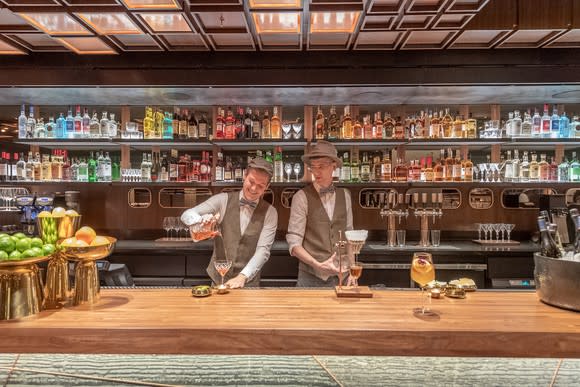What Starbucks' N.Y. Roastery Is Really Brewing
At first glance, one could easily assume that Starbucks' (NASDAQ: SBUX) upscale Roastery locations were designed strictly for spectacle: Their vibe feels like a cross between a theme park and a shrine dedicated to coffee. But in fact, the four locations -- Seattle, Milan, Shanghai, and the just-opened New York -- form a pivotal part of the chain's premium strategy.
The new, nearly 23,000-square-foot Roastery in New York follows the same blueprint as the others. It offers two coffee-serving experiences, as well as the chain's first "Arriviamo Bar," a craft cocktail bar "where expert mixologists will serve coffee- and tea-infused cocktails," according to a press release.
Customers can also order food from the Princi bakery. Items served at Princi will be baked fresh in the store.

The New York Roastery will offer a menu of cocktails. Image source: Starbucks.
What do the Roasteries do?
These Roastery locations serve multiple roles. They, of course, offer customers a premium coffee experience driven by knowledgeable baristas. Think of them as the coffee equivalent of a high-end wine bar.
They also distribute limited-supply premium beans to stores in their region. (They aren't just called Roasteries -- they actually roast beans on site). This aspect will become even more important as Starbucks opens more Reserve stores, and adds Reserve bars to about 20% of its locations.
Lastly, and perhaps most importantly, each Roastery is a research and development center that Starbucks can use to test new products in a real-world environment.
"Beverages such as Draft Nitro, Cold Foam and the [recently launched] Juniper Latte all began at the Roastery and have since been introduced to Starbucks locations around the world," explained CEO Kevin Johnson in the press release.
Draft Nitro and Cold Foam appear to be major winners for the company -- popular menu expansions that have become permanent fixtures. The Juniper Latte -- a surprise addition to the company's holiday season menu -- is aimed at more of a niche audience.
But Starbucks needs both home-run menu additions and lesser hits that keep its hardcore customers from growing bored. The original Roastery in Seattle has regularly produced successful new menu items, some of which have become core products for the company.
If you can make it there
Starbucks plans to bring Roastery locations to major cities around the world. New York was picked for the second U.S. location because the company already has an astounding 350 locations across the city's five boroughs.
If the New York location succeeds, it will provide the chain with an additional proof of concept as it moves forward with its premium plans. That's important because the Roastery/Reserve brands were former CEO Howard Schultz's project. He actually oversaw their growth after he moved from CEO to the executive chairman role.
Johnson has not spoken much about the premium brands. During the fiscal fourth-quarter earnings call, the Roasteries only got casual mentions, and their results were not broken out. On past calls, Schultz had celebrated the fact that the Roasteries drove larger check sizes.
The challenge the company faces from here is making the hub-and-spoke model -- under which each Roastery supplies select Starbucks locations with limited-edition beans and maybe drinks -- work. It seems likely that the chain will have customers who want these types of offerings, so a successful rollout should increase same-store sales at existing locations.
New York's Roastery will advance the company's premium business while determining whether a market exists for a caffeine-meets-mixology cocktail experience. That's especially important given the company's desire to attract more evening business, and its previous failures in its attempts to profitably introduce alcohol in select locations.
In the end, success for the Roasteries won't be based solely on how many sales they directly generate. It will be determined by whether they can drive the premium/reserve strategy for the larger company.
More From The Motley Fool
Daniel B. Kline has no position in any of the stocks mentioned. The Motley Fool owns shares of and recommends Starbucks. The Motley Fool has a disclosure policy.
